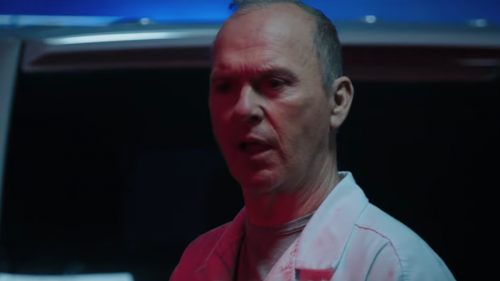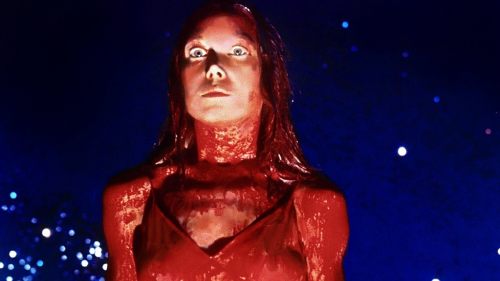CARRIE Movie Review: A Serviceable Remake - And Why That’s Unfortunate
Thematically speaking, Carrie is a compelling story about coming of age, navigating the new discoveries about yourself as a young woman, and questioning the idea of a woman's responsibility for her female "power." These were great concepts in Brian De Palma's 1976 version of Carrie. Unfortunately for director Kimberly Peirce, we've heard it all and seen it all before... exactly the same way.
There's nothing new or inventive in Peirce's approach to the story, save for a few visual gags that almost feel as though they were the genesis for remaking the story in the first place. And no, this isn't a different adaptation of the same source material -- this is a flat-out remake of De Palma's adaptation. Where Carrie gets it wrong is when the focus is more on the visual effects concepts, and the film's blatant race to the finish line approach to reaching its inevitable blood-soaked and fiery conclusion does little to quell that concern. In the hands of any other director, you might not expect much more than a paint-by-numbers approach, but in the hands of Peirce, who gave us the incredibly poignant Boys Don't Cry, Carrie feels like a huge letdown. There is nothing new to be said here because Stephen King's book and De Palma's film said it all before, and it's been said again in other horror films that intertwine the concepts of the supernatural with a young woman's coming of age. It's not that Peirce doesn't understand the concepts of being ridiculed for being different, or how bullying can drive a good person over the edge, or that the idea of having magic powers can serve as a mirror at the moment when a girl becomes a woman. It's the time in her life when she's bestowed with new, horrifying attributes that everyone assures her are "gifts" -- gifts that she never asked for or wanted. Things start happening to her body that she has no control over, and so she finds solace in the one thing she can control: moving objects and people with her mind. When a girl comes of age, she has newfound powers over boys; when Carrie comes of age, she discovers new powers that are equally as dangerous.
But again, these are all the same ideas paraded around in De Palma's Carrie. If you've never seen that film or read the original story, these concepts may seem more potent, but for the majority of viewers, it's just the same movie all over again. There's no modern twist, no character definition beyond the too-basic, exposition-heavy dialogue. Chris is a mean, entitled little girl who likes to torment Carrie. Sue feels guilty for making fun of Carrie, so she convinces her cute boyfriend Tommy to take Carrie to prom because there's no better remedy for privileged white guilt than bare-minimum charity. You threw tampons at a half-naked, naive girl who was experiencing her first period in the school shower? Giving her a nice prom experience is the least you could do. Really.
What's undeniable is Peirce's ability to get good performances out of her actors. Aside from some misguided magic power face-acting from Chloe Moretz in the titular role, this is a film with solid performances. Julianne Moore as Carrie's religious zealot mother is more restrained than you might expect, and there's some additional creepiness with her proclivity for self-harm. Moretz tries her best to be awkward and homely, fumbling around like a bag of wooden blocks. Her mannerisms and facial expressions while in telekinetic mode are a little odd, but maybe that's intentional -- she is playing with something she's not very educated about, which reads like a little girl trying to play house in her mom's clothes. Judy Greer gives a fun performance as Coach Desjardin, one of Carrie's only real lifelines at school, and she does her best with her limited dialogue.
In fact, much of the dialogue is the kind of minimum requirement writing that's calculated to hit particular beats in X amount of time. Peirce isn't interested as much in the character explorations and motivations as she is in getting to the prom scene, making a 100 minute film feel like 20 minutes. That breeziness is both a blessing and a burden -- by not exploring Carrie's upbringing (though there is a great birthing scene in the opening moments of the film) or spending more time on the relationship with her mother, it doesn't give Carrie enough motivation or even justification for the horror to come. While the shower scene at school is traumatizing enough for any teen, we've already seen it, and it doesn't shock or pinch nerves the same way it did in 1976 (or in the 80s or 90s, depending on when you discovered the original film).
And that's the inherent problem with remaking something like Carrie, or remaking any horror film, really -- there's a certain demand to up the ante, to raise the stakes, to give us something we haven't seen before. There's no rule that says Peirce and writers Lawrence D. Cohen and Roberto Aguirre-Sacasa have to hew so closely to the original story. They've got the themes down, and they know the tone and intent of the narrative. There's plenty of room to explore and play and excavate, to build real depth of character and give us something more poignant. Peirce has shown she's capable of this sort of understanding of character, but where is it in Carrie? Instead of expanding upon the premise and giving us something new in character, Peirce gave us some new death gags, like a couple of pretty gruesome scenes involving a windshield and a set of high school gym bleachers. Focusing on Carrie as a justifiable revenge fantasy totally misses the point, so glorifying the climactic prom sequence with fancy digital effects and having Moretz melodramatically wave her arms around like a Jedi using the Force detracts from the horror upon horror of the story and gives it a Final Destination spin, where the audience is incited to excitedly gasp and squeal at the creative ways in which Carrie kills people. Additionally, the story may be timeless, but the dialogue is not, and so much of it is ripped from the 1976 version that it's out of place and stilted here.
Optimistically speaking, Carrie could have been worse. But the depressing truth is that it could have been so much better. One has to wonder how limited Peirce and her writers were by the studio and the people with money in remaking this story -- what other reason could there be for such a servile and serviceable remake? Let's handle it the way the film does with its own issues: by not dwelling on it too much.



